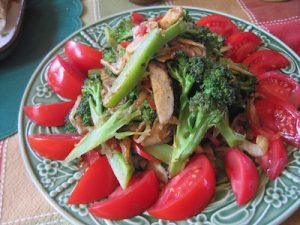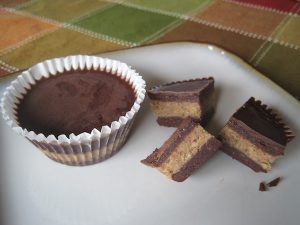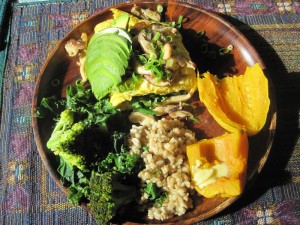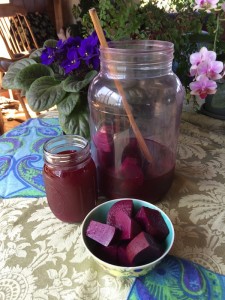by Courtney Coleman |
 Well, I must now apologize for teaching people for 12 years that tomato, potato, eggplant, and peppers increase inflammation, and thusly pain, in the body. Anthony William the “Medical Medium” has beautifully debunked this limiting belief for me, after reading his book (which he says was inspired from spirit), called “Life-Changing Foods”.
Well, I must now apologize for teaching people for 12 years that tomato, potato, eggplant, and peppers increase inflammation, and thusly pain, in the body. Anthony William the “Medical Medium” has beautifully debunked this limiting belief for me, after reading his book (which he says was inspired from spirit), called “Life-Changing Foods”.
What I had read multiple times from various books, articles, and websites, is that these nightshade fruits/veggies contain an alkaloid called solanine, which exacerbates inflammation in the body. So, I’d been recommending that people with arthritis, chronic neck/back pain, MS, etc. eliminate these foods to see if their pain level decreased, as my pervious whole-food-healing sources said they likely would.
But what Anthony channels is that only the leaves and stems of the nightshade family plants contain solanine and are toxic. Once the fruits/veggies of these plants are ripe though, they don’t contain any solanine at all. And, in fact, these ripe fruits/veggies are actually very helpful and nutritious for the body.
He cautions to avoid unripe nightshades such as green bell peppers and unripe green tomatoes, as they can be an irritant, except with varieties like green zebra tomatoes which are a green color when ripe.
He says, “In the rare case when someone eats a juicy, ripe tomato on its own, or a plain steamed potato, and experiences the onset of symptoms, it’s practically guaranteed that she or he has symptoms when eating other types of healthy fruits and vegetables too. It’s a sign that she or he is dealing with an elevated pathogenic load – the fruits and vegetables causing a detox reaction.”
Chinese medicine teaches that nightshade fruits/veggies are very yin (as opposed to yang) in the energetic effect they impart. They cause energy to rise and expand in the body, leading to “spacey”, ungrounded/unfocussed mental states, which can actually balance out the tension from stress or activities which take great concentration. Macrobiotics, the nutrition aspect of Chinese medicine, recommends cooking nightshade fruits/veggies with miso, seaweeds, or salt, and also parsley to offset their overly expansive effect.
My Solar Nutrition guru Hugo would say that nightshades have the most beneficial effect on the body when they’re eaten vine ripe and in season. So, I try to avoid the store-bought pale tomatoes most of the year, as well as the green bell peppers. Once you have a super sweet, tangy, sun-warmed heirloom tomato from a summertime farmer’s market, there’s no going back!
Anthony William says that the real problem with nightshades in our modern foods, is the other foods they are often prepared with. For example, ketchup is laden with high fructose corn syrup. French fries are fried in refined vegetable oil and coated with refined salt.
He says to instead try the nightshades in healthy ways, such as; red bell pepper sticks with homemade hummus, baked potato with salsa and avocado, steamed eggplant drizzled with olive oil and lemon juice, and vine ripe tomato stuffed with tahini sauce.
From my personal experience in helping people heal and thrive with whole food cooking, I’ve seen that each person is unique, with unique biochemistry, and that everyone’s needs change here and there throughout their lives. So, the need for quieting the mind and tuning in to your present needs, and how you feel after eating certain types of foods, will be an ongoing practice. I truly hope it is a graceful and joyful journey toward better and better vitality for you!
by Courtney Coleman |

Disordered eating is much more common than you may realize, but resources for help get better all the time as psychology reveals its emotional roots. In reading the book, Eating In The Light Of The Moon, by Anita Johnston PhD, I remembered my childhood friend’s extended problem with bulimia, and, I realized that I have my own emotional issues around controlling my food.
I remember that my friend was always the tallest girl in our class throughout grade school, and unfortunately, she was also the chubbiest. Being the “Big Girl” couldn’t have been easy for her, and her shyness, and low self-esteem showed. In 5th grade, she came down with a bad virus, and she was out of school for about 3 weeks. It was astonishing when she returned to school a thin version of her former self. She’d lost what looked like about 30 pounds!
She was elated about her new shape. From that point on, she’d bring a lunch to school but she’d only eat the apple in it. She wanted to stay slim and healthy, like her Mom. I remember that she’d never overeat anymore when we’d hang out after school and on weekends. She was on the skinny train, and she was going to stay on it.
What surprised me shortly after this point, was when she said that her Mom had told her it was okay to make herself throw up once in a while if ever she overate or felt too full. “OMG, WHAT?!?!”, I remember thinking. And so began 8-10 years of an off and on bulimic roller coaster for her. She saw it as normal, but she hid it from everyone. I actually tried it several times myself, but I didn’t get addicted to it, and so my weight didn’t fluctuate like hers did. She’d go through phases of stopping vomiting, overeating, gaining weight, and then the cycle would start all over again.
I don’t actually know what helped her to get off the roller coaster, because we drifted apart after high school. But I still wish, before she’d become malnourished, that I’d been able to hand her the book I just finished reading.
The subtitle of this excellent book is: how women can transform their relationships with food through myths, metaphors, and storytelling. It’s rich with stories from ancient times as well as Anita’s own stories, so it’s actually fun to read. I found myself at the end of the book, well before I’d anticipated I’d finish it.
This book is valuable because through stories, truths are symbolic instead of literal, so they’re easy to apply personally. These symbolic truths help us to connect to our inner world of emotional needs, our deepest beliefs, our natural rhythms, to the rhythms of Mother Earth, and to the power of our intuitive wisdom. Anita Johnston helps us uncover our true feelings and needs, both from our recent experience AND from our childhood, from which we may have distracted ourselves with our patterns of controlling our food.
Halfway through this book, I realized that over the course of the past 20 years in developing my own expertise in healing with whole food nutrition and cooking, and in exercising great discipline with food nearly 100% of the time, was my unfounded childhood belief that I needed to have control over something.
This book was invaluable to me, it was a fun and quick read, and now I pass it on to you, because you never know who’s life it might save.
by Courtney Coleman |

We’ve all been told to stay away from saturated fats, and to embrace unsaturated fats like vegetable oils. But there are now more and more scientific studies that point to cholesterol NOT being the cause of heart disease…not nearly as much as trans fats in the diet and/or a high glycemic diet.
There ARE healthy vegetable oils like good quality virgin (unrefined) olive & sesame oils, and these oils should not be used with high heat in cooking. You see, even these healthy, unrefined vegetable oils develop trans fats with heat or pressure, which is why the processed food industry can claim “zero grams trans fats” when using these oils. But after these oils are made into cookies, crackers, and chips, trans fats ARE formed!
Processed/refined vegetable oils such as canola, corn soybean, “vegetable” oils not only develop trans fats with the heat or pressure of processing, but they oxidize and decrease your body’s stores of valuable omega-3 fats, increasing inflammation. When used for cooking they form long-chain trans fatty acids, which act like a sticky matrix in the arteries, which good saturated fats adhere to. This is why consuming refined vegetable oils raise your risk for cardiovascular disease, especially when combined with saturated fats.
Personally, I stay away from most cookies, crackers, and chips, because they’re usually made with canola, corn, soybean, palm, or vegetable oils. And I especially avoid them if they’re made with hydrogenated oils (like shortening and margarine), as these are the highest in trans fats. I also steer clear of foods cooked with vegetable oils at restaurants, especially the fried foods.
1 in 4 Americans over the age of 45 are on statin drugs to lower their cholesterol, but as you can see now, cholesterol is not the issue. These drugs have been shown to only end up lowering cholesterol a small amount, and most importantly, they impair the body’s ability to make Co enzyme Q10, a fat soluble antioxidant which protects our cells from oxidation. They also impair your body’s production of both vitamin K2 and ketone bodies. If you want to stay on a statin drug, you’ll want to consider supplementing CoQ10, or the more absorbable form of it called Ubiquinol, as well as vitamin K2.
Statin drugs benefit just 1 percent of the population. This means that out of 100 people treated with the drugs, one person will have one less heart attack. This doesn’t sound so impressive, so statin supporters use a different statistic called “relative risk”, so with this statistical sleight of hand, statins suddenly become beneficial for 30 to 50 percent of the population.
While saturated fats do increase cholesterol, cholesterol is a very important component of our bodies because a major building block of our brain and nervous system is cholesterol, and cholesterol also feeds our glands which secrete important hormones. Most importantly, if your body doesn’t get any dietary cholesterol, your liver will begin to over-produce it.
So, it’s important to know which fats actually contribute to heart disease, and which ones don’t, which fats to use for cooking, and which fats to steer clear of in packaged foods, so I listed them for you at the bottom of this post.
Sources:
1) Dr. Weston A. Price: Dangers of Statin Drugs: What You Haven’t Been Told About Popular Cholesterol-Lowering Medicines https://www.westonaprice.org/health-topics/modern-diseases/dangers-of-statin-drugs-what-you-havent-been-told-about-popular-cholesterol-lowering-medicines/
2) Dr. John Douillard: The Scary Facts About Vegetable Oils
https://lifespa.com/scary-facts-polyunsaturated-vegetable-oils/
3) Dr. Joseph Mercola: 5 Great Reasons Why You Should Not Take Statins
https://articles.mercola.com/sites/articles/archive/2016/02/10/5-reasons-why-you-should-not-take-statins.aspx
Story at-a-glance: There is evidence showing that statins may actually make your heart health worse and only appear effective due to statistical deception / Statins deplete your body of CoQ10, inhibit synthesis of vitamin K2, and reduce the production of ketone bodies / Statins increase your risk of serious diseases including cancer, diabetes, neurodegenerative diseases, musculoskeletal disorders and cataracts
Tips On How to Protect Your Heart Health, by Dr. Mercola
Reduce excess weight by eliminating excess sugars in your diet. It is vitally important to eliminate gluten-containing grains and sugars, especially fructose.
Consume a good portion of your food raw.
Make sure you are getting plenty of high-quality, animal-based omega-3 fats, such as krill oil. Research suggests that as little as 500 mg of krill per day may improve your total cholesterol and triglycerides and will likely increase your HDL cholesterol.
Replace harmful vegetable oils and synthetic trans fats with healthy fats, such as olive oil, butter and coconut oil (remember olive oil should be used cold only; use coconut oil for cooking and baking).
Include fermented foods in your daily diet. These will not only optimize your intestinal microflora, which will boost your overall immunity, but will also introduce beneficial bacteria into your mouth.
Poor oral health is another powerful indicator of increased heart disease risk.
Optimize your vitamin D levels, ideally through appropriate sun exposure as this will allow your body to also create vitamin D sulfate — another factor that may play a crucial role in preventing the formation of arterial plaque.
Exercise regularly. Make sure you incorporate high-intensity interval exercises, which also optimize your human growth hormone (HGH) production.
Stop smoking and drinking alcohol excessively.
Be sure to get plenty of high-quality, restorative sleep and practice stress-management techniques.
GOOD SATURATED FATS for cooking
Coconut, Palm, Butter, Ghee, Lard, Tallow, Chicken Fat, Lamb Fat, Duck Fat, Full Fat Dairy (preferably raw dairy products), Eggs, Meat, Seafood
GOOD UNSATURATED FATS for cold uses (salad dressing, etc)
Olive Oil, Sesame Oil, Nut Oils, Flaxseed Oil, Avocado, Nuts & Seeds
BAD SATURATED FATS
Hydrogenated Oils, Shortening, Margarine, “buttery spreads”
BAD UNSATURATED FATS
Canola Oil (Rapeseed), Corn Oil, Vegetable Oil, Soybean Oil, Grapeseed Oil, Sunflower Oil, Safflower Oil, Rice Bran Oil
NOTE: “high oleic sunflower oil” and “high oleic safflower oil” are less damaging
Sources:
www.westonaprice.org
www.mercola.com
www.lifespa.com
by Courtney Coleman |

WARMING FOODS ACCORDING TO MACROBIOTICS
Oats, Wheat, Rye, Kamut, Amaranth, Spelt, Quinoa, Sweet Brown Rice Sunflower Seeds, Walnuts, Sesame Seeds, Pine Nuts, Chestnuts
Butter, Meats, Good Fats
Yam, Parsnip, Potato, Burdock, Sturdy Winter Greens (brussels sprouts, collard greens, kale, etc.)
Parsley, Onion, Garlic, Leek, Mustard Greens
Black Beans, Adzuki Beans, Lentils
SPICES:
Carob, Cinnamon, Clove, Basil, Ground Ginger, Fennel, Rosemary, Pepper (all kinds), Cumin
Warming Cooking Techniques:
Baking, Pressure Cooking, Slow Cooking (crock pot)
Warming Cooking Elements:
Unrefined Salt, Miso, Tamari, Sauerkraut, Green Onion, Sea Vegetables, Ginger, Dried Herbs
by Courtney Coleman |

I read another great article by Dr. Mercola recently that points to potassium deficiency being a greater contributor to high blood pressure than excess sodium intake.
Also, he says that insulin resistance (pre-diabetes) from eating a high glycemic / high sugar diet, causes high blood pressure because it decimates the body’s stores of magnesium, calcium, potassium, and nitric oxide.
Dr. Mercola talks about avoiding table salt as much as possible (in processed foods and restaurant foods), as this kind of refined salt (sodium chloride) isn’t found anywhere in nature. Salt in this refined form increases blood pressure AND acidifies the blood pH. Refined salt (Morton salt), is like a toxin in the body, whereas unrefined salts like Celtic, Himalayan Pink salt, and Real Salt are an important source of various trace minerals.
Food-State minerals are one of the most important keys to longevity. The problem we run into these days, is that our soils are depleted of minerals. The plants can create food-state vitamins easily in depleted soils, but the minerals must be replaced in the soil with cover crops or good compost. One supplement I take every day, because I can’t be sure the veggies I buy are grown in well-supplemented soils, is called Essential Minerals from Lifespa.com
In researching foods which help lower blood pressure, I came across these listed:
Magnesium-rich foods (brown rice, almonds, spinach, avocado, etc….again, grown in mineral-rich soils)
Probiotics
Omega 3 fats
BEETS
Garlic
Apple Cider Vinegar
Arugula
Flax seed
And, in researching LIFESTYLE FACTORS which help lower blood pressure, I came across these:
Whole food diet vs. restaurant foods/processed foods (cookies, crackers, chips, etc)
Daily movement/activity
Being with a Cat
Getting enough re-mineralized water daily
Important Points from Mercola’s article:
(LINK to entire article by Dr. Joseph Mercola)
“Medical professionals have been prescribing a low-sodium diet to people with high blood pressure, since salt is believed to cause hypertension. However, research shows that sodium may not be the “bad” mineral that it’s played out to be. In fact, you actually need sodium to maintain and regulate healthy blood pressure levels.
“While adopting a low-sodium diet can indeed decrease blood pressure readings, it may also worsen your total cholesterol-to-high-density lipoprotein (HDL) ratio, which indicates an increased risk of heart disease.
“Considering all the adverse effects that sodium deficiency may cause, consuming foods that contain little to no salt may be worse for your overall health.
“A healthy kidney can take around 86 grams of salt per day. However, you should limit your salt intake to 2,300 milligrams per day if you have an endocrine disorder, high aldosterone level, Cushing’s syndrome, elevated cortisol or Liddle syndrome.”
 Well, I must now apologize for teaching people for 12 years that tomato, potato, eggplant, and peppers increase inflammation, and thusly pain, in the body. Anthony William the “Medical Medium” has beautifully debunked this limiting belief for me, after reading his book (which he says was inspired from spirit), called “Life-Changing Foods”.
Well, I must now apologize for teaching people for 12 years that tomato, potato, eggplant, and peppers increase inflammation, and thusly pain, in the body. Anthony William the “Medical Medium” has beautifully debunked this limiting belief for me, after reading his book (which he says was inspired from spirit), called “Life-Changing Foods”.

